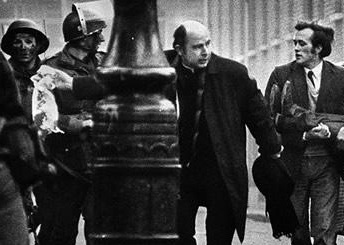The Rt Revd Edward Daly, Bishop of Derry during the decades of violence known in Northern Ireland as “The Troubles,” has died at the age of 82.
The BBC has original footage of the younger Daly, a curate at the Cathedral, waving a bloodied white handkerchief as he led a group of men carrying an injured boy away from the Bloody Sunday massacre in 1972. Daly told the BBC,
“I said a prayer with him and I anointed him and gave him the last rites. We decided to make a dash for it. I went in front with this handkerchief in my hand and they carried Jackie behind me. …
“All hell was let loose. They were firing lead bullets in all directions. They call themselves an army, it was utterly disgraceful. There was nothing fired at them, I can say that with absolute certainty because I was there. The people were running in all directions. Most of them had their backs to them and they just opened fire.”
When they laid him down, Jackie Duddy had died.
The Guardian’s coverage of Daly continues,
Daly was utterly opposed to political violence but equally opposed to the destructive politics that had created the unjust system of government in Northern Ireland. His was a political ministry by force of the inequalities of Northern Ireland, but particularly of Derry.
He was still only 40 when in 1974 he was appointed bishop of Derry, and that appointment was largely in tribute to the powerful way he had handled the aftermath of Bloody Sunday. He remained in the post until a stroke forced his early retirement in 1993, but even then he continued to work with politicians, notably John Hume, the Social Democratic and Labour party leader who in 1998 won the Nobel peace prize jointly with the Ulster Unionist David Trimble for their work to achieve the Good Friday Agreement and power sharing in government. …
A powerful critic of British handling of the politics of Northern Ireland in Britain as well as in Ireland, in 1994 Daly was an influential witness at the appeal hearing of the Birmingham Six, the men wrongly convicted of the 1973 Birmingham pub bomb, which killed 21 people. But he was also strong in his condemnation of the violent politics of paramilitary organisations.
He clashed with the IRA most dramatically in 1987 when he banned requiem masses with the body present at IRA funerals. This was after the IRA had breached his trust by firing shots to cheers over a coffin. Daly, having negotiated that there should be no guns present, was outraged: “If I did not take the most serious view of this situation, when several hundred people who, by some stretch of their own imagination, profess themselves to be Christians applaud and cheer an act of desecration of this nature, I would be failing in my responsibility.”
Despite his reputation as a peacemaker, Daly did not escape the scandals that beset the Church in later years.
He was one of those being investigated for protecting abusive priests, who had, in the 1970s, been moved to other parishes rather than removed or prosecuted. He also spoke in defence of the Sisters of Nazareth, one of the religious orders accused in 2014 of physical abuse of children in their orphanages. The Sisters, he said, had done extraordinary work in times of appalling poverty, and physical punishment, while now seen as wrong, was common then.
Among tributes from church leaders and politicians recorded by the BBC, Britain’s Northern Ireland Secretary, described Daly as
an iconic figure in civic life, and he will long be remembered as a cleric who worked tirelessly to promote peace for all.
Find more coverage of Bishop Daly’s life and career in the Guardian, the New York Times, and the BBC.
Featured image: detail from BBC coverage of the 1972 massacre: Fr Edward Daly

